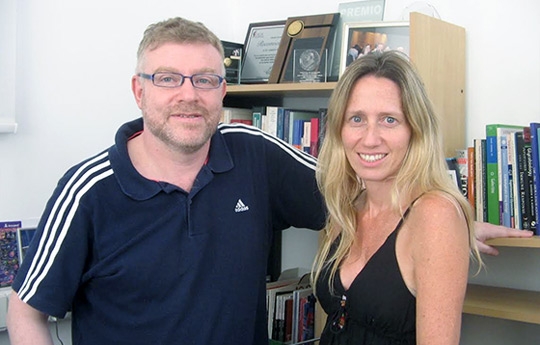Biological and Health Sciences
New advances in the fight against cancer
A study reveals the interactions among certain microorganisms, the immune system and the development of tumors.
A collaborative study between the laboratory of researcher José Conejo García of the University of Philadelphia, USA, and the Laboratorio de Inmunopatología del Instituto de Biología y Medicina Experimental (IBYME, CONICET-FIBYME) revealed the relationship between certain microbes and the growth of distal tumor in the organism. According to the result, some intestinal bacteria activate Toll-like receptors (Toll 5 or TLR5). This leads to several inflammations that trigger tumor growth. For the researchers, the possibility of deciphering the interactions between some microbes and the immune system will promote the discovery of new ways to battle cancer.
“It is known that human beings are colonized with trillions of microbes (microbiota) in the gastrointestinal and the respiratoty tracts, and the skin”, Gabriel Rabinovich, senior researcher of the CONICET at the IBYME and one of the authors, explains. “These bacteria are beneficial: their presence represents the first line of defense against some infections and they maintain the immune response on the alert”, he adds. Nevertheless, recent studies prove that the interaction between certain bacteria and the immune system are vital to control tumor progression in a positive or negative form.
The scientists state that the immune system can identify the bacteria by identifying the Toll-like receptors present in the immune system cells. It is a fact that around 7.5 % of population harbours a different consequence in this receptor which invalidates the function of one TLR: the TLR5.
“This ‘harmless’ variant in the sequence is called polymorphism. In spite of the fact that this polymorphism is found in healthy individuals, it was linked with an increase in the sensitivity to certain diseases related to infections”, Rabinovich comments and adds that so far its influence in cancer was not identified.
It has been recently revealed that when the intestine microbiota activates the TLR5 path different events are triggered and impact on the tumoral progression even if they are out of the intestine. Scientists found that the TLR5 signalling modulates the advance of certain types of extraintestinal cancer and this depends on the capacity of the tumor to produce IL-6, a small molecule (cytokines) that increases the inflammation.
“In mice bearing ovarian cancer or sarcoma, which have the TLR5 active, the commensal bacteria can drive the production of IL-6 and encourage two types of different cells to increase galectin-1 production, a protein with immunosuppressive properties whose presence promotes cell escape to the immune response of tumor cells, the formation of new vessels and tumor growth”, Rabinovich explained. Together with his team, the researcher has studied the role of this protein in cancer and inflammatory diseases for many years.
For the authors, the most significant part of these results is that this pro-tumoral phenomenon depended on the presence of the commensal bacteria. If TLR5 active mice were treated with antibiotics, that is to say, if the commensal bacteria in their intestines were killed, the growth of distal tumor would decrease.
As regards that, the researchers proved that in the case of breast cancer, the situation is quite the opposite. Mice with the same polymorphism, meaning that they do not have the functional TLR5, bear tumors incapable of producing IL-6 too but they have a more aggressive tumor growth. In these cases, Rabinovich states that the key molecule is another cytokine called IL-17, which is generated in large amounts and triggers tumor growth.
This study was published in the January edition of the prestigious magazine Cancer Cell and it was selected as the feature article of the month in that publication. Click here to read the original publication.
About the research:
- Melanie R. Rutkowski. The Wistar Institute, Philadelphia. USA.
- Tom L. Stephen. The Wistar Institute, Philadelphia. USA.
- Nikolaos Svoronos. The Wistar Institute, Philadelphia. USA.
- Michael J. Allegrezza. The Wistar Institute, Philadelphia. USA.
- Amelia J. Tesone. The Wistar Institute, Philadelphia. USA.
- Alfredo Perales-Puchalt. The Wistar Institute, Philadelphia. USA.
- Eva Brencicova. The Wistar Institute, Philadelphia. USA.
- Ximena Escovar-Fadul. The Wistar Institute, Philadelphia. USA.
- Jenny M. Nguyen. The Wistar Institute, Philadelphia. USA.
- Mark G. Cadungog. Helen F. Graham Cancer Center. USA.
- Rugang Zhang. The Wistar Institute. USA.
- Mariana Salatino. Associate researcher. IBYME.
- Julia Tchou. University of Pennsylvania, USA.
- Gabriel A. Rabinovich. Senior researcher. IBYME.
- Jose R. Conejo-Garcia. The Wistar Institute, Philadelphia. USA.
